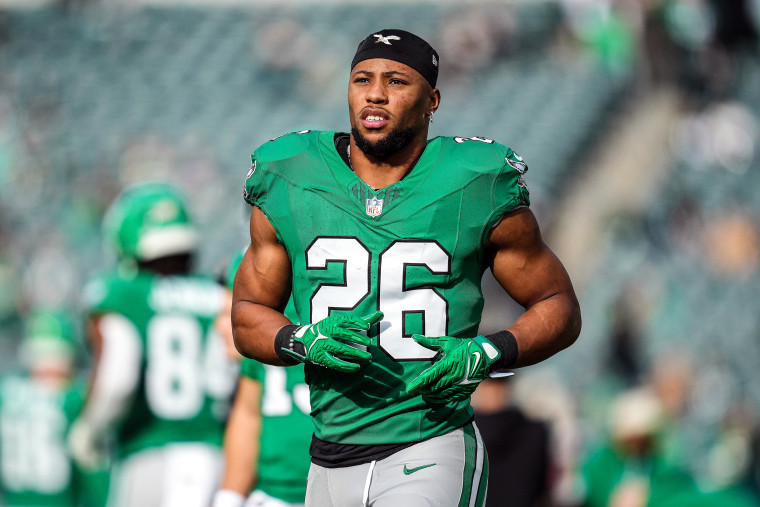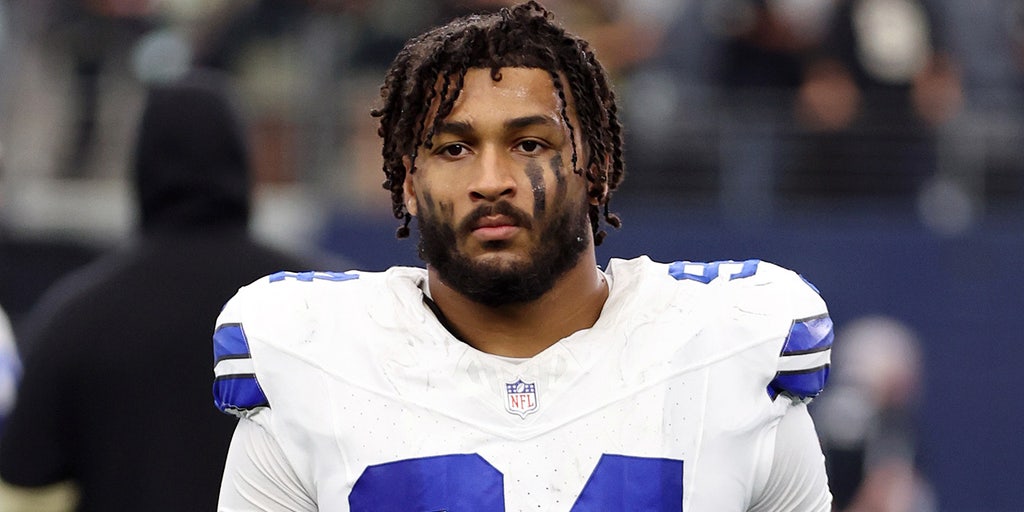The news sent a chill through the entire NFL community. Two days before his untimely death, Marshawn Kneeland — a young, rising star whose passion and potential had made him one of the league’s most promising defensive talents — reportedly visited the Philadelphia Eagles’ team headquarters. What he did there was routine, sources said. What he left behind, however, became the center of one of the most haunting mysteries in recent league history.
According to multiple insiders, an Eagles employee revealed that Kneeland had stopped by the facility quietly, unannounced. He wasn’t there for official business, nor for a scheduled meeting. Instead, he came alone — wearing a hoodie, his backpack slung over his shoulder — and spent about half an hour in the locker room area. He greeted a few staff members, smiled, and asked how everyone was doing. No one suspected anything was wrong. He seemed calm, even reflective, as if he was saying a subtle goodbye without anyone realizing it.
Two days later, the devastating news of his passing broke.
As the investigation into his death unfolded, the FBI took possession of Kneeland’s personal belongings, including his phone. What they discovered deepened the mystery even further: a 17-second audio recording and an unsent text message to New York Giants star Saquon Barkley. The text contained just three words — simple, chilling, and heartbreakingly unfinished.
Authorities have not yet confirmed what those three words were. But several sources close to the investigation said the message was emotional — something deeply personal that may hold clues to what Kneeland was feeling in his final hours.

For fans and players alike, the revelation reignited both sorrow and speculation. Why would Kneeland have reached out to Barkley, a player from another team, just before his death? What connected the two men beyond the field? And what was contained in that short, mysterious voice memo?
Those who knew Marshawn Kneeland best describe him as deeply introspective. He was not the type to speak without meaning, and he often used voice recordings as a personal journal. Former teammates said he sometimes recorded short reflections after practices — reminders to himself about focus, gratitude, and family.
“It was his way of grounding himself,” one former teammate said. “He’d say things like, ‘Keep your head up, remember why you’re here.’ It wasn’t for anyone else. It was how he coped with the pressure.”
That’s why the 17-second audio clip found on his phone is now so important. According to a source familiar with the FBI’s ongoing analysis, the recording captured a single phrase followed by silence — as if he had started to speak but stopped himself. It wasn’t a cry for help, nor a confession. It was, as one investigator put it, “a fragment of thought frozen in time.”
In the days following the revelation, Saquon Barkley was approached by reporters after practice. He didn’t go into detail but admitted, “Yeah, I knew Marshawn. We talked sometimes. He was a good dude, thoughtful — one of those people who always asked how you were doing before talking about himself.” When asked about the message, Barkley’s voice faltered. “If he tried to reach out… I wish I could’ve seen it sooner,” he said softly.
The connection between the two men likely stemmed from their shared understanding of the toll professional football can take. Both had faced injuries, public scrutiny, and the relentless weight of expectation. For many players, it’s a lonely grind beneath the bright lights — and sometimes the strongest ones hide the deepest exhaustion.
What makes Kneeland’s final days so heartbreaking is how normal they seemed. In the week leading up to his passing, he had attended practice sessions, exchanged jokes with teammates, and even talked about plans for the offseason. Coaches described him as “focused but quiet.” No red flags, no signs of distress.
But those who have studied the psychology of athletes say that’s often how it looks from the outside. Dr. Eric Mallory, a sports psychologist who has worked with multiple NFL teams, explained in an interview that “elite athletes are conditioned to mask pain. They’re taught from a young age to push through, to never show weakness. By the time someone sees the signs, it’s usually too late.”

The details surrounding Kneeland’s final visit to the Eagles’ facility are now being reviewed by both the team and the league. One staff member told investigators that he seemed contemplative, “like he was looking around one last time.” Another recalled that Kneeland paused near the field tunnel — the same tunnel through which he had once dreamed of walking out on game day — and stood there silently for nearly a minute.
When asked what might have brought him to Philadelphia in particular, theories vary. Some say he had close friends on the team, others believe he was visiting a mentor in the coaching staff. There’s also speculation that he was considering a potential future move, or simply stopping by to clear his head in a familiar environment.
But what stands out most is that everything Kneeland did in those final days seemed deliberate — calm, reflective, even purposeful.
The 17-second audio file and the three-word text have become symbols of that haunting intentionality. Though the FBI has not disclosed their contents publicly, rumors have spread through social media and fan forums, each trying to piece together what he might have meant. Some claim the words were “Tell him thanks.” Others believe it was something like “I forgive you,” or “It’s all right.” None of these versions have been verified.
Regardless of the exact message, what’s clear is that it carried emotion — the kind of message one sends when trying to make peace, not just with others, but with oneself.
In the aftermath, players from across the league began speaking openly about mental health again. The tragedy sparked renewed conversations about the hidden emotional cost of the sport. Broncos quarterback Bo Nix — who had spoken movingly about Kneeland in a leaked locker room video — addressed reporters once more. “It hurts, man,” he said. “When someone like Marshawn is gone, it’s not just a headline. It’s a wake-up call. We’ve got to look out for each other — not just on the field, but off it.”
Teams began organizing counseling sessions and peer support programs. The NFL Players Association released a statement pledging to expand mental health outreach, acknowledging that “too many of our brothers suffer in silence.”
Meanwhile, the Eagles set up a memorial space inside their training facility — a small corner with a framed photo of Kneeland, surrounded by candles and letters from players across the league. “He came here one last time,” an employee said quietly. “Now this space belongs to him.”
For Saquon Barkley, the incident has clearly left an emotional scar. Days after the story broke, he shared a simple message on social media: “Check on your friends. Especially the strong ones.” The post went viral within hours, echoed by countless athletes, fans, and sports organizations.
What remains unresolved is what exactly Kneeland wanted to say in those final 17 seconds — what message he hoped to send, or to whom. Investigators are reportedly considering whether the audio was meant as a draft for a conversation he never had, or perhaps as a private reflection meant for no one else to hear.
But maybe the words themselves don’t matter as much as what they represent — a reminder of how fragile even the strongest among us can be.

The more the story unfolds, the clearer it becomes that Marshawn Kneeland’s legacy extends far beyond the field. His passing has forced the NFL to confront difficult truths: that the pursuit of greatness often demands silence in moments when what players really need is space to speak; that the line between strength and suffering is thinner than anyone likes to admit.
In time, the contents of that 17-second recording and the three-word text may be revealed. But even if they never are, they’ve already changed the conversation. They’ve reminded fans, teams, and players alike that behind the glory and the noise, every athlete carries unseen weight — and that sometimes, the smallest gestures, the quietest goodbyes, hold the loudest truths.
As one of Kneeland’s former coaches said during a tribute, “We may never know what those three words were. But maybe that’s the point. Maybe he wanted the rest of us to fill in the blank — with care, with empathy, with action.”
The silence he left behind is heavy. But in that silence, something new is beginning to grow — a commitment to listen better, to see deeper, and to never again let the unspoken stay unspoken.